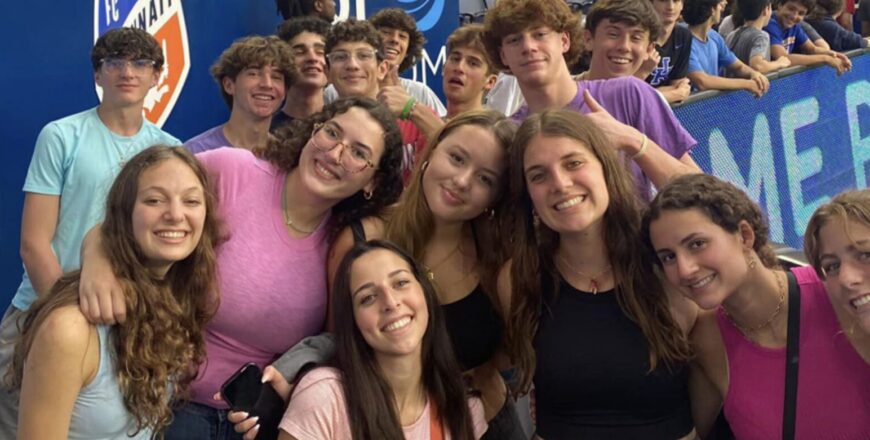
A New Era Calls for New Knowledge: Q&A with Brian Jaffee, CEO of the Jewish Foundation of Cincinnati
The Jewish Foundation of Cincinnati has engaged Rosov Consulting on multiple projects over the past twelve years—from data mining and analysis to its approach to grantmaking, and more. To share the nature of this work with others, we recently sat down for a Q&A with Brian Jaffee, the Foundation’s CEO. We hope you enjoy his reflections and insights.
Q: Tell us briefly about your role with the Jewish Foundation of Cincinnati.
A: The Jewish Foundation of Cincinnati is a private grantmaking organization in the Cincinnati Jewish community. We grant around $20 million a year in the areas of Jewish engagement, Jewish education, and social services. As the CEO, I work with the trustees, our staff, and our partner organizations to find the highest and best use for those grant dollars.
Q: When and why did the Foundation first engage Rosov Consulting?
A: We first engaged Rosov Consulting in 2010, which was really the start of our new era as a Foundation. Previously, we owned a hospital; when we sold that our assets almost quadrupled. At that point, we knew that we had to behave differently as a Foundation and needed some strategic help in determining what kind of grantmaking organization we could be in this new era. We interviewed a few candidates and Rosov Consulting really rose to the top.
Q: Since that time, and through the multiple projects in which you’ve engaged Rosov Consulting, how has the relationship evolved?
A: We’ve had a great relationship with them over the 12-year period. Wendy is such a unique and central thought partner and strategic guide in our work. Her team over the years has just been so consistently strong and they’ve really helped us with a lot of the technical aspects of strategic grantmaking, including help in gathering data and data analysis. The survey work they’ve done for us on our teen initiative and other projects—really the work in measurement and evaluation in general—has been very consequential.
Q: Are you able to share a specific item or two about how Rosov’s work has informed the Foundation’s grantmaking and strategy?
A: A really clear example of Rosov Consulting’s value-add started about four or five years ago. We spent a great deal of time, money, and effort on a community study and were really pleased with the product. Yet it still takes a lot of work and expertise that we don’t necessarily have to do a deep dive into that data and to more fully understand its utility. The data was conveying important information about three constituencies in particular—interfaith families; young families with kids ages 0 through 5; and young adults without children. Rosov’s data mining and data analysis helped to identify insights that were particularly actionable. Those insights have been part of our strategic plan ever since.
Q: Has Rosov Consulting’s work informed your grantmaking approach?
A: Yes. Rosov Consulting helped us refine our process both on the front end in terms of what our grant application looks like, as well as the back end and our reporting structure. They helped us develop a good process for preparing a grant docket and determine the right level of detail for staff to summarize what is in grant proposals for the trustees. So, yes, they really did help a great deal in the grantmaking process.
Q: Can you point to something that the Foundation does differently thanks to the partnership with Rosov?
A: I really go back to our docket preparation; it’s much more sophisticated than it was before we began working with them. Before it was just, “take the materials in whatever shape they came in from the grantees, show them to the trustees, and then just ask the trustees what they thought about it.” Now we understand the effective ways to present a grant proposal—with the information that’s important for them to know and what information might be considered oversharing.
Q: Can you share something that you, the Foundation staff, or even the trustees learned through the years of partnering with Rosov? Is there a specific or general learning that comes to mind or a different way that the Foundation approaches things now?
A: We’ve learned a lot about measurement & evaluation in general, and the concept of demonstrable outcomes is one that really comes to mind. We now understand that this isn’t about only making a grant because it does or doesn’t meet one of our demonstrable outcomes. In other words, the demonstrable outcomes are not the same thing as strategic priorities. Rather, demonstrable outcomes are what make up our measures of success. Through a combination of grants that we’re making, and through our portfolio as a whole, we can see the needle moving in various directions on seven different demonstrable outcomes that we have. It took us a while to wrap our heads around these concepts, but the Rosov team are patient guides and stuck with us.




